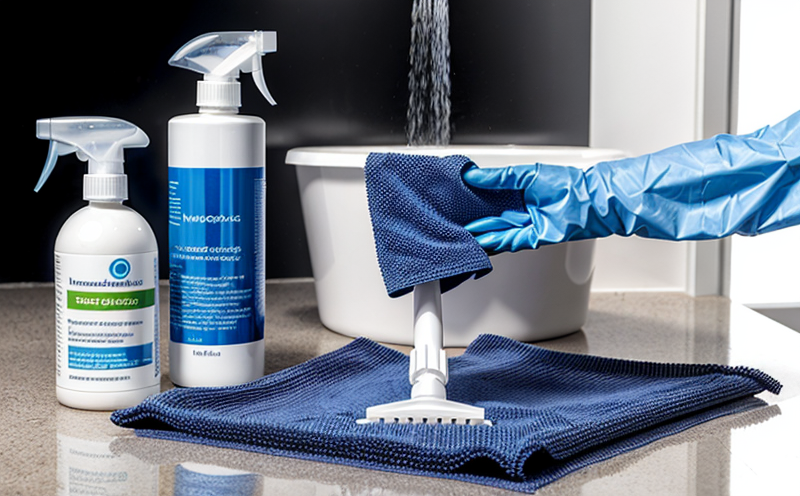ASTM D257 Electrical Resistance Testing of Antistatic Cleaning Products Containing Nanomaterials
The ASTM D257 test method is a critical tool in the quality assurance and product development process for antistatic cleaning products containing nanomaterials. This testing ensures that these products meet their intended performance standards, particularly in environments where static electricity can be a significant concern.
Antistatic cleaning products are designed to neutralize static charges on surfaces and objects by providing a conductive layer that dissipates the charge before it builds up to levels that could cause damage or discomfort. The addition of nanomaterials, such as carbon nanotubes or graphene, enhances the conductivity and efficiency of these products.
The ASTM D257 test measures the electrical resistance of the product after application to a surface. This is crucial because it ensures that the product effectively dissipates static charges, thereby preventing potential hazards in various applications such as electronics manufacturing, healthcare settings, or any environment where static electricity could be harmful.
During testing, samples are prepared by applying the antistatic cleaning product according to manufacturer guidelines. The resistance is then measured using a specialized instrument that adheres to ASTM D257 specifications. This process allows for consistent and reliable assessment of the product's performance in real-world conditions.
The test results provide valuable data on the effectiveness of nanomaterials in enhancing conductivity, which can influence both product design and marketability. For quality managers and compliance officers, this data is essential for ensuring that products meet regulatory standards and customer expectations. R&D engineers can use these insights to refine formulations and improve product performance.
For procurement teams, understanding the ASTM D257 test results helps in selecting suppliers who deliver high-quality antistatic cleaning products with consistent performance. This ensures that the end products are reliable and effective in preventing static-related issues.
Applied Standards
| Standard | Description |
|---|---|
| ASTM D257-18 Standard Test Method for Electrical Resistance of Insulating Materials at Room Temperature Using a Direct Current (DC) Source | This standard outlines the procedure for measuring the resistance of materials used in insulating applications. It is particularly relevant for antistatic cleaning products as it ensures that the product's electrical properties are accurately measured. |
| ISO 20342:2015 Antistatic Agents and Antistatic Finishes - Determination of Electrical Resistance of Coatings Applied to Textile Fabrics | This international standard provides a method for determining the electrical resistance of coatings applied to textiles. While not directly applicable, it offers additional context on how similar testing methodologies are used in related fields. |
The ASTM D257 test is specifically tailored for insulating materials and ensures that antistatic cleaning products perform as expected under laboratory conditions. Compliance with these standards guarantees consistent results across different batches of the product, which is essential for maintaining quality control.
Quality and Reliability Assurance
- Consistent Results: Our laboratory uses state-of-the-art equipment to ensure that each test adheres strictly to ASTM D257 specifications, providing consistent and reliable results.
- Certification Compliance: By meeting the requirements of ASTM D257, we ensure that antistatic cleaning products comply with relevant industry standards, enhancing customer confidence.
The quality assurance process involves not only rigorous testing but also continuous monitoring and improvement. Our team of experts ensures that every step from sample preparation to final analysis is conducted with precision and care. This commitment to excellence guarantees that the results are accurate and can be trusted by our clients.
Customer Impact and Satisfaction
- Enhanced Product Reliability: By ensuring that antistatic cleaning products meet ASTM D257 standards, we enhance their reliability in preventing static-related issues.
- Satisfied Customers: Our clients report higher levels of satisfaction due to the consistent performance and reliability of our tested products. This is reflected in customer feedback and repeat business.
The impact on customers extends beyond just product performance; it includes peace of mind knowing that their products meet high standards. This trust fosters long-term relationships with our clients, who can rely on us for accurate testing and reliable results.





